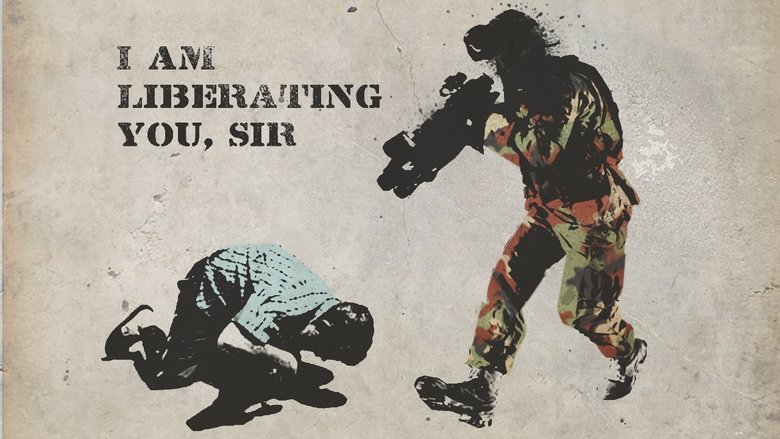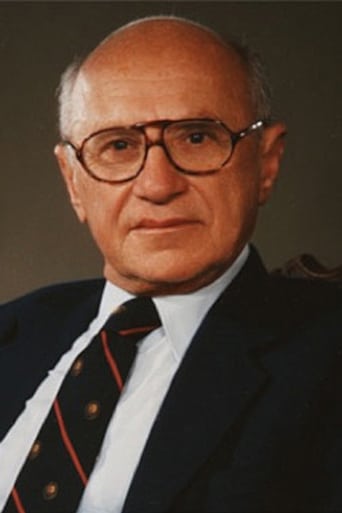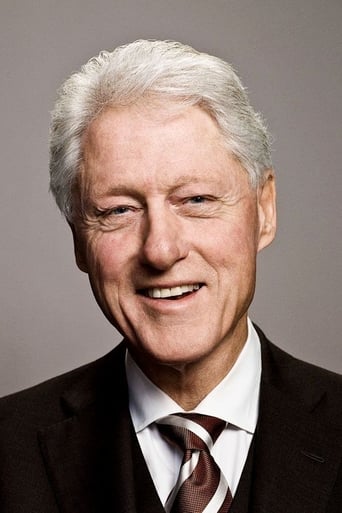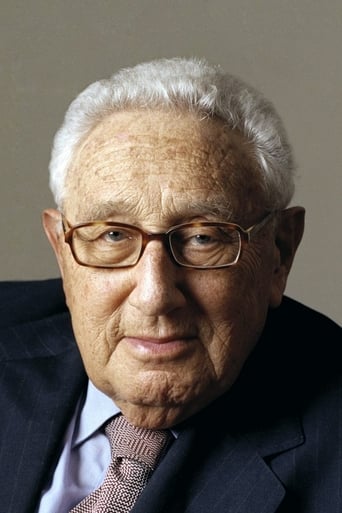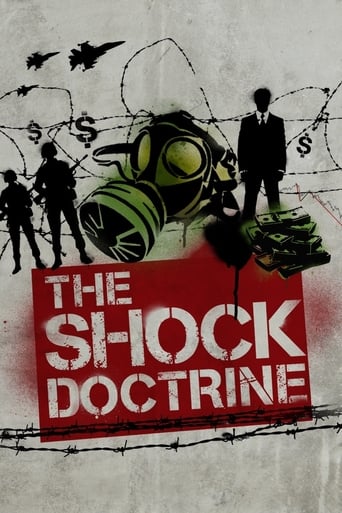
The Shock Doctrine
September. 01,2009An investigation of "disaster capitalism", based on Naomi Klein's proposition that neo-liberal capitalism feeds on natural disasters, war and terror to establish its dominance.
Similar titles
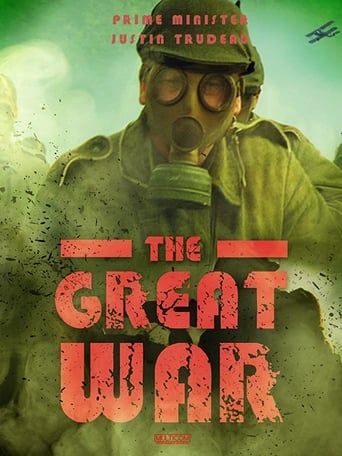



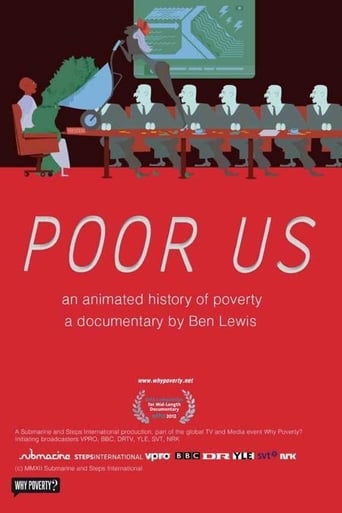

Reviews
A Masterpiece!
it is finally so absorbing because it plays like a lyrical road odyssey that’s also a detective story.
A terrific literary drama and character piece that shows how the process of creating art can be seen differently by those doing it and those looking at it from the outside.
It is a whirlwind of delight --- attractive actors, stunning couture, spectacular sets and outrageous parties. It's a feast for the eyes. But what really makes this dramedy work is the acting.
As the economic incentive for peace is lost or defeated, and is increasingly replaced by investment in an endless and un-winnable 'War on Terror', and the capitalistic exploitation of disasters, both natural and man-made, there is a danger that one part of human society will begin to look increasingly like Israel, with its walled-off areas, and massive 'homeland security' apparatus . and the other like Gaza This film by Michael Winterbottom, based on Naomi Klein's terrifying book 'The Shock Doctrine :the Rise of Disaster Capitalism', attempts to show how we arrived at this critical point in history. The film is faithful to the themes of the book and makes good use of contemporary newsreels and pertinent interviews, some conducted by Ms Klein herself. An important documentary, thoroughly recommended.
The question on my mind after seeing The Shock Doctrine was whether ends justify means. Quite possibly, this is the question Klein wanted to be asked, because much of her case regards the distasteful means taken in order to further free market economics, tactics which the very proponents of these dogmas may feel they want to disassociate themselves with. However, my question was about Klein's/Winterbottom's own tactics.The film uses all methods that we've grown used to from modern politics: cherry-picked facts, "proofs" by emotionally-charged metaphors, hinted claims of guilt by association, sound-bite slogans that are repeated incessantly, and, of course, scare tactics. Sad to say, I've come to expect these things from political candidates that need to make their points in a 30-second TV appearance. I've even come to expect them in rating-seeking news programs. But have we stooped so low that these tactics are now par-for-the-course in documentaries, where a film-maker has 90 minutes of canvas to make a clear, compelling, and well-argued case? I happen to agree with Klein's stance that extreme capitalism is dangerous, and I think what we are seeing in both Europe and China in recent years (e.g. the collapse of Chinese nation-wide education and health policies) are just further proofs of the narrative Klein forwards. However, I don't see that there is a well-argued case here that would convince someone claiming that any change, good or bad, rarely happens in a peaceful way, or that the ultimate outcome of privatization is better than the alternative. In fact, only a handful of minutes of this film are devoted to the question of what the final outcome of extreme capitalism looks like, historically, and these minutes are full of unsubstantiated claims thrown into the air in what is exactly the tactic Klein warns against: shock a person for just over an hour, and suddenly that person becomes much more open to suggestion, at which point you can sprinkle some of your favorite dogmas on him.So, perhaps this film does a good job with all those who are willing to be convinced by visceral arguments, the likes of which have, unfortunately, come to dominate the public discourse, but I rather promote those who educate people to think. Scaring people to make the choices you think are right... well, that's what this film is all about. Isn't it?
Shameless propaganda. Naomi Klein is an activist, with no economic or business understanding whatsoever. It is a shame that in modern times a primitive, incredibly biased and ignorant work like the "shock doctrine" can be a bestseller. She denounces capitalism (a system the vast majority of countries are using in the world: China, Russia included) which has helped so many poor countries escape the shackles of failed socialist economics (only North Korea and Cuba remain - see how those are doing), like it is some sort of bogeyman. Clearly, she has never had a course in development nor macro economics - and yet she is somehow supposed to be this great visionary? What a joke.But most annoyingly she accuses Milton Friedman of being responsible for the actions of the Pinochet regime. That's like accusing Henry Ford for drunk people dying in car accidents, or accusing Chinese for all the paper cuts in the world. It's actually even worse, since how the economy is structured has nothing to do with how oppressive the government is. What is most shameful, however, is that she never actually bothered to research that Milton Friedman was a person who promoted personal freedom and liberty to people above all, and that he personally resented what the Pinochet regime did. (though most likely she did, but just lied)A shameless propaganda, that insults Milton Friedman, accuses him of doing something he never did. A economic failure of a book/movie. Naomi Klein is either incredibly ignorant, or pathetically black-hearted to lie in such a way.
When you base a film upon a very fixed point of view, in my opinion, you have two options. You either spring for objectivity, within the realm of possibility, or you side overwhelmingly with the point of view. I have not read Naomi Klein's work, but since she has been accredited the manuscript, I find it sound to believe that this film is her total point of view. According to it, Capitalism is a tried and failed project that should be replaced with it's counterpart - a large, public governance. The film starts in 1951 with the development of shock therapy as metaphor for the consequences of the same technique employed with society. To be specific, the shocks with which war, terror and other streamline upsetting events have altered history. Per Ms. Klein's theory they have proved useful to those of a capitalistic persuasion, who have utilized, shall we say, a moment of weakness in larger circumstances to push through radical changes. Changes that would eventually lead to the reason we have had a Darwinian economical system since after WW2. The course of the film shows the awful situations in Chile, Argentina and Russia to mention a few, the way they were handled by America and Britain, and the results. Unfortunately the film had a lot of statements, but failed to follow through with thorough factual proof and the choice of images as well as length of certain horrid war clips, I felt, left the viewer with a thirst for the whole story. In the end, the film mentions Obama's comparisons to FDR citing that only if we "make him do it", as FDR would say at the end of staff meetings in his presidency, we can change the wreck in which our faith in capitalism have landed us. Too bad is that Obama has campaigned for the cease of relentlessly ideological battles against one another, for neither being liberal nor democratic nor republican. Just plain reasonable. I think maybe Winterbottom and Whitecross' film would have benefited from taking this certain point of view. Even though the film puts the spotlight on history that should late be forgotten and needs to be put in perspective, it still fails to make the viewer feel well-informed. It rather seems to be rallying for the viewer to join the cause.
Top Streaming Movies











